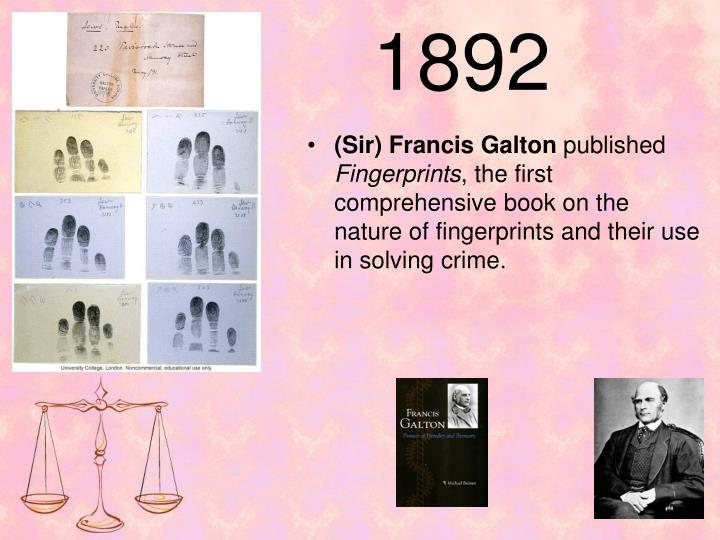
.jpg)
While he was at it, Galton also developed the first system for classifying and identifying fingerprints. 40 points What made Francis Galtons research so valuable to the field of forensic science He was able to prove the difference between strangulation and.
#GALTON FORENSIC SCIENCE SERIES#
Galton took the task very seriously and imparted on a series of empirical studies that allowed him to document not only that no two people have the same fingerprints but also that a person's fingerprints remain largely unchanged over the course of his or her life. Darwin was too old to take on this task, and so he recommended his younger cousin, Francis Galton. As the initiator of scientific meteorology, Galton invented the weather map, proposed a theory of anti-cyclones, and was the first to establish a complete.
#GALTON FORENSIC SCIENCE HOW TO#
For example, Faulds suspected but did not know how to demonstrate that no two people have the same fingerprints. In 1880, a physician named Henry Faulds asked Charles Darwin for some help in documenting some important properties of fingerprints.

Galton came to study fingerprints in a roundabout way.

However, his studies of fingerprints turned out to have some very important consequences. Identification of a human being by means of fingerprint matching may be associated with forensic science, but it is also. He had hoped to show that different racial groups had different fingerprints, but his detailed empirical observations did not agree with this hypothesis. As a result of Galtons book the British Government in 1894 officially adopted fingerprinting as a supplementary system to visual evidence for the. Hans Gross Hans Gross was a lawyer by profession and spent many years studying the principles of a criminal investigation. In 1892, he published a book on the fingerprint. Francis Galton has conducted the first definitive study of fingerprints and their classification. (He usually failed, by the way, and he often did so because his biases about race caused him to test false hypotheses.) In fact, it was Galton's fascination with racial differences that prompted him to take a close look at fingerprints. Francis Galton He has known as the Father of Fingerprint. He also spent a lot of time trying to develop simple tests that would tell him something about a person's race or intelligence. In his review of Nicholas Wright Gillhams book, A Life of Sir Francis Galton (Books et al., 19 April, p. Galton took physical measurements of people all over the world, measured the heights of hundreds of British schoolchildren (and their parents), recorded and analyzed weather patterns, and conducted the first systematic studies of the shared traits of identical twins. He created psychometrics, the science of assessing mental faculties, and differential psychology, the field of psychology concerned with psychological. One such psychologist was Sir Francis Galton. In the late 1800s some mathematically-inclined psychologists became obsessed with measurement.


 0 kommentar(er)
0 kommentar(er)
